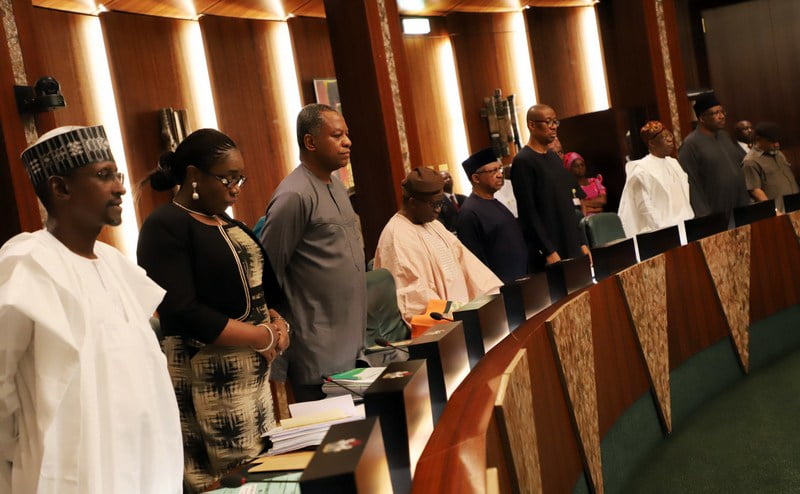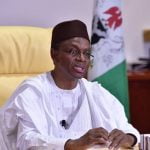Nigeria’s Federal Executive Council (FEC), Wednesday approved three memos submitted by the Minister of Power, Works and Housing, Babatunde Fashola.
The first was for the construction of the 44.625 kilometres Babban Lamba-Shandam Road in Plateau State at the cost of N19.392 billion.
Mr. Fashola, who briefed State House correspondents after the meeting, said FEC also approved the reconstruction of the 81-kilometre Lagos-Ota-Abeokuta Road.
He said the contract for the road was first awarded in 2000, adding, “it has since been left uncompleted because there were no budgetary provisions for it”.
He said the All Progressives Congress administration is now trying to move the contractor back to site.
He said because of the long abandonment, it has become necessary to review the contract sum.
“So the revised rate was brought to council today and a revision of N22 billion was approved for the 81 kilometers road, bringing the total contract price to N56.701 billion,” he said.
The third approval, according to Mr Fashola, was for section four of the Enugu-Port Harcourt Road, the part between Aba and Port Harcourt.
He said the Port Harcourt part of the road has been problematic and has failed severally.
“We have a contractor there but we needed to change the design because of the storm water drainage needs and the high water tables there so that the road does not fail.
“So that requires a revision of the scope of work to include retaining side lanes and also drainage facilities in the sum of N6.309 billion,” Mr Fashola said.
On his part, the Minister of Water Resources, Suleiman Adamu, said he presented a policy memo highlighting the crisis facing water and sanitization in the country and the need for government to take action.
He said he informed FEC that urban water supply was regressing in Nigeria, while access to improved sanitation had also decreased over time.
Because of that, he said Nigeria is not able to meet the Millennium Development Goals and that works services in the rural areas are unsustainable.
Mr. Adamu also said spending on water sector has declined by 7 to 0.72% of the GDP in 2010.
“We submitted a memo to council to approve an action plan on how to address these issues.
“We had three prayers for the council to approve the action plan: to declare a state of emergency on water and sanitation sector; to approve the establishment of Water, Sanitation and Hygiene Fund (WASH) for the country.
“This fund will be one that federal, states and international donors can put in money so that we can begin to address the crisis of water and sanitation sector in the country.
“We also requested that henceforth the budget for water and sanitation in the country should be significantly increased so that we will be able to face these challenges. Council accepted our prayers and we will move on,” Mr. Adamu said.
The Minister of Interior, Abdulrahman Dambazau, who also briefed reporters, said FEC had approved a contract for the completion of two faculty buildings and Cadet Mess and Cafeteria for Police Academy in Kano.
He said the request is to meet the minimum requirement by the academy before getting accreditation of some of its programmes.
“In May 2010, a memo was submitted for the approval of a draft bill when it was upgraded to a degree awarding institution.
“So the total amount of the contract is about N234 million. Once it is completed, we will invite the NUC to have a look at some of the programmes that are yet to be accredited,” Mr. Dambazau said.
Earlier, spokesperson of President Muhammadu Buhari, Garba Shehu, said the Minister of Women Affairs, Aisha Alhassan, also briefed the council on women empowerment programmes being undertaken by her ministry.
He said Mrs Alhassan also spoke about capacity development for women, promotion of human rights, fighting violence against women, rehabilitation of victims of gender violence, promoting the health of women and children, and the efforts on the rescue of Chibok and Dapchi girls.
“Council commended the women affairs ministry for a job well done,” he said.
Mr Shehu said the Minister of Information, Lai Mohammed, spoke on the achievements made in his ministry.
He said such achievements include “bringing down the wall that screens out Nigerians in the military engagement in the northeast and the role played in the prompt release of Dapchi girl”.
He said the Ministry has also instituted town hall meetings, 11 of which have been held so far across the country.
He said the town hall meetings are ways of getting feedback from the country.
He said Mr. Mohammed spoke about the national sensitization campaigns on insecurity in the country.
“He spoke about the institution of regular interaction with Broadcasting Organization of Nigeria, Nigeria Union of Journalists and other relevant bodies.
“Also interaction with International Press Institute that are coming into Nigeria for their World Congress in June this year,” he said.
He said the Information Ministry has equally made progress with the digital switchover campaigns.
“At the end of the day, the council decided to Set up an inter-ministerial committee to fashion out a marshal plan for communications for the ministry to sit down and advise government on how policies and programmers can be better disseminated.
“In particular to advise government on how the ministry and its agencies can deliver on its own mandate.
“The ministers on the committee are finance, agriculture, budget and national planning, power, works and housing, transportation, communications, Information and Culture, petroleum and Niger Delta,” Mr Shehu said.






2 Comments